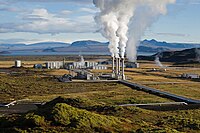Portal:Iceland/Selected article/7
Renewable energy in Iceland has supplied over 70% of Iceland's primary energy needs since 1999, proportionally more than any other country. The remainder of its energy needs are produced from imported oil and coal. Iceland is at the forefront of renewable energy research and plans to become the world's first hydrogen economy, with all of their private automobiles, fishing boats, and public transportation running on hydrogen fuel. This would make Iceland the first completely energy-independent country in the world, using 100% renewable energy sources.
Of the 99.9% of Iceland's electricity that is currently generated from renewable sources, 81% is generated from hydroelectric power; virtually all the remainder from geothermal power. Geothermal sources are also used to heat 89% of the households in Iceland, with the remaining being heated with electricity. The nation ranked 53rd in the list of countries by carbon dioxide emissions per capita (2003), emitting 62% less than the United States per capita, despite using more primary energy per capita.

